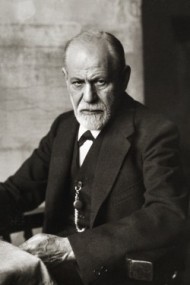
This is the second article in a series that starts with the question: Is lucid dreaming safe? One of most frequent arguments against lucid dreaming is the notion that lucidity disturbs the process—and the function—of dreaming.
It’s a strange critique, because the function of dreaming remains unknown. But for many clinical practitioners, dreams are thought to perform psychological duties that are best left untouched by the “tainting” force of self-awareness. The dream is a beautiful wilderness, destroyed by the civilizing effects of the waking ego. Can lucidity destroy our inner nature?
The Roots of Distrust
The clinical dis-ease of lucid dreaming may in part be rooted in dream theories of the fathers of psychology: Sigmund Freud and Carl Jung. Freud only mentions lucid dreaming in a tiny note in his later editions of Interpretation of Dreams. Freud never experienced lucid dreaming, and did not have a chance to read the works of his lucid dreaming contemporaries Frederic Van Eeden and Hervey de Saint Denys.

Freud was skeptical. He thought it a “secondary revision” of memory. Furthermore, he thought that if it was possible, it would only censor the dream’s message, a process he called the dreamwork.
Carl Jung also never directly commented on self-awareness during the dream. For Jung, dreams reflect a lifelong maturation of the personality called individuation. Some Jungians today argue that lucidity disturbs the process of individuation by putting the dream ego in control of something that is much more powerful and ancient than we could possibly understand.1
It’s always been a bizarre position, seems to me, as some styles of lucid dreaming have much in common with Jung’s method of active imagination, a way of interacting with the dream from a relaxed waking state. As Jungian psychotherapist James Hall and psychiatrist Andrew Brylowski noted in 1991, in both active imagination and lucid dreams, we can enter into a fruitful dialogue with spontaneous imagery and narrative.
Lucidity as Tainting the Dreaming Mind
There’s three main issues with this idea that lucidity is damaging or somehow unnatural.
First, lucid dreams are not the same as control dreams. You can be lucid and not in control of either the dream environment or the dream body. And you can regularly direct the dream’s direction without lucidity. Dream control is a separate skill than maintaining self-awareness in the dream. They often come together, but this may be a culturally-entrained association.
Regarding lucid control dreams, the unconscious mind is still doing most of the heavy lifting anyways. Awareness, choice, and occasional bouts of dream-stomping magic don’t add up to dream generation. Robert Waggoner says it best, “does the sailor control the sea?”
But, are some control dreams denying the dream’s voice–I would venture yes. I do not have a doom and gloom perspective about this co-creative work, however. Lucid control dreams can be worked therapeutically like any other dream. Ironically, lucid control dreams dovetail right into one of Freud classic theories about dreams: that they can reveal conscious wishes.
Secondly, this myth rests upon a false dualism: that the dream is an unconscious process, and lucid dreaming is a conscious one.
This notion assumes dreams are experiences that happen to us, in which the dream ego makes few choices but rather is dragged along by the force of the dream.

Studies in cognitive psychology paint a different picture, in which dream narratives have been shown to be full of choices, thoughts, and active decision making. Thinking about feelings, wondering about choices, and other kinds of complex dream thoughts are called “meta-cognition.” A 2010 study by Tracey Kahan and Stephen LaBerge found that dreams have similar levels of meta-cognition awaking life experiences.
That’s a startling claim, showcasing a couple things:
1. Dreaming thought is much more complex than we’ve given it credit for.
2. Waking life is not as lucid as we might expect!
In this light, lucid dreaming is not a conscious dream, but a more conscious dream.
Seriously, if dreaming was wholly unconscious, we would not remember the experience. Are all dreams we remember tainted by consciousness?
Spontaneous Lucid Dreaming
The last issue I have with the view that lucid dreaming is a conscious corruption of the dream is that many people, myself included, have had spontaneous lucid dreams throughout their lifespan.
[pullquote]Has my dreamlife really been corrupted since I was six years old?[/pullquote]
Because lucid dreaming is a learnable skill, critics of lucid dreaming (who more often that not have not experienced it for themselves) have assumed that it is only through “tricks and tactics” that the rational ego injects itself into a dream, proceeding to muck up the works.
But spontaneous lucid dreams are fairly common: many lucid dreamers have the experience and then later learn that this ability has a name. According to one early study, 20% of the population have spontaneous lucid dreams once a month.2 Even the master of lucidity induction, Stephen LaBerge, had his first lucid dream as a child, long before he began his studies about lucid induction methods.3
And of course, consciousness in dreams has been around for thousands of years before modern psychology could tsk-tsk. We were probably lucid dreaming in the Stone Age, given that our brains have not changed much, if at all, in the last 100,000 years.
Lucid dreaming is natural, and there’s room for consciousness in our dreams. Awareness does not imply exploitation, because the dream is not an untouched wilderness.
We already live here.
Next up: is lucid dreaming evil or sinful?
Notes
1 For a dated, but still relevant, review of contemporary dreamworkers and therapists who have argued against lucid dreaming, see Shafton’s Dream Reader p. 470.
2 Snyder, T. J. & Gackenbach, J. (1988), Individual differences associated with lucid dreaming. In J. Gackenbach and S. LaBerge (Eds), Conscious Mind, Sleeping Brain (pp. 221-259). New York: Plenum Press.
3 The Mind at Night: the new science of how and why we dream by Andrea Rock, p. 50
First Image (cc) Wilderness by Elido Turco – Gigi
Very interesting article ! I think it relates to some things I’ve been pondering lately if may ramble a bit:
I recently had a lucid dream in which my dream ego and another aspect of consciousness which seemed to be ‘directing’ dream content briefly merged.
It was a very strange experience-hard to put into words. I was in a room trying to remember my plan when I suddenly sank through the floor.Then ‘I’ was watching a dream senario play out like watching a movie.I felt an expansive ability to effect the future actions of the dream characters.I willed one to trip and fall,a moment later it did. I had no ‘dreambody.’
I began to feel uncomfortable with the situation as I worried that my lucidity would slip away into regular dream consciousness.I also felt slightly insane,like it was too much to handle.Colors were very vivid.
Then just as I entered,I was raised back up through the floor and continued my Lucid Dream. It was then peppered with dream-like content that ‘I’ had to resist becoming entrained with…
I really strongly agree with the statement that “dreaming thought is much more complex than we’ve given it credit for.”
I believe that things we tend to consider unconscious dream content is only so relative to the ‘waking’ chain of memory and association.I think there are multiple chains that exist in our (divided)consciousness that become somewhat accessible to the ‘waking’ ego in Lucid Dreaming.
There is something that directs and plots.Something that chooses and creates the exact colors and dimensions of environments.A script writer,special effects producer,music creator,etc,etc….
My personal theory is that Lucidity is an integration of parallel ego-memory states with our waking ego chain of memory.I believe this because of the experience of becoming Lucid and/or apparently OBEing into dream bodies within environments which have their own internal logic and history already in progress.I think this ‘integration’ may be facilitated by a higher manager like ‘The Hidden Observer” that Robert Waggoner talked about in his excellent book.
How could regular dreams not be in consciousness?It seems like our waking egos may be present; but only in a more diffuse state. I think it is more a question of how consciousness becomes divided ,partitioned and possibly diffused? What our waking ego considers conscious may be a relative and biased viewpoint ? And what is really beyond our ego(s) ?
Very good article Ryan! You are a good writer,I think you always present a fair and diverse set of viewpoints.
Thanks,
Jeff
I like the “mythbusting” work you do with the articles like this and the one about shooting in Tucson. It makes you real – you are familiar with actual topics in society. It sets the ground for upcoming dream researchers.
* I’ve been picking up a lot of this idea lately that there is not “the” state of consciousness, and there are not even many, but there are endless possibilities of levels in consciousness, all with many different parameters, pros and cons.
Jeff – thanks and great dream. selfhood gets weird in dreams… it’s weird in waking life too but we can see it more plainly in these dreams when the imaginal world is not constrained to representing our senses. selfhood doubles, and can triple, and can dissolve. the boundaries of me and not me are in constant flux in the dream. it’s marvelous stuff. I like the discussion of the “voice behind the dream” –I’ve experienced it myself– but I think it’s more appropriate to say “voices” or “managers.” there’s a lot of processes/selves/personalities/needs that are unconscious simultaneously – they are not necessarily all part of a cohesive whole. some voices may be more trustworthy than others.
Taavi — thanks as well for the mythbusting comment. I had a teacher who was fond of saying “consciousness shifts in an instant.” yeah, there’s many graduated levels. if you’re into this kind of consciousness mapping, I recommend the works of Ken Wilber. Integral Spirituality is a good place to start.
Thanks for the reply Ryan,
Great comment and very timely for me I might add! I actually experimented with ‘the voice behind the dream’ twice last night. It told me some things which are quite shocking that I do not trust…LOL.. I’ll look for a second opinion!
I’ve done alot of reading on this stuff ( I have Ernest Hilgard’s book coming in the mail) but I have not read too much Ken Wilber-I’ll check him out.
I recently found these links that you might like,I think they’re related. Maybe the dream lives of these patients are bleeding into the waking world?
http://www.nytimes.com/1988/06/28/science/probing-the-enigma-of-multiple-personality.html?pagewanted=all
http://www.esalenctr.org/display/confpage.cfm?confid=3&pageid=24&pgtype=1
Hi Ryan
I totally agree with your understanding of lucid dreaming. Exactly what you are saying, is what I have been experiencing.
As you were saying that some control dreams deny the dream’s voice. Exactly what I have experienced. When I experience Lucid Dreams, it feels natural and provides me with answers. But when I venture into Control Dreams, I start feeling weird and sometimes I am not sure whether I am dreaming or awake, while I am actually awake. It is not a nice experience.
As the subconscious is 95% and the mind is 5%, I also feel that lucid dreaming is exactly equal to that equation and therefore totally natural. I even feel that this is the optimum state to be operating in.
Cheers Romina
I disagree that lucid dreaming is a learned skill.
I’ve always gone to bed thinking about something that I wish to dream about and then I do.
I am the director of my dreams so I’m always in control . I have never before learned that this is due to a learned skill? Could this be due to my obsessive personality? , people are allways telling me I think too much. I must say that on occasions I have purposely emptied my mind so as to have a good nights sleep. On these occasions I have had nightmares, the stuff of great horror movies which I don’t direct or have any control over. I could wake up traumatized from these so I don’t like leaving dreams to my unconscious processes. I have studied Freud, Jung etc as I have an hons BA in Psychology.